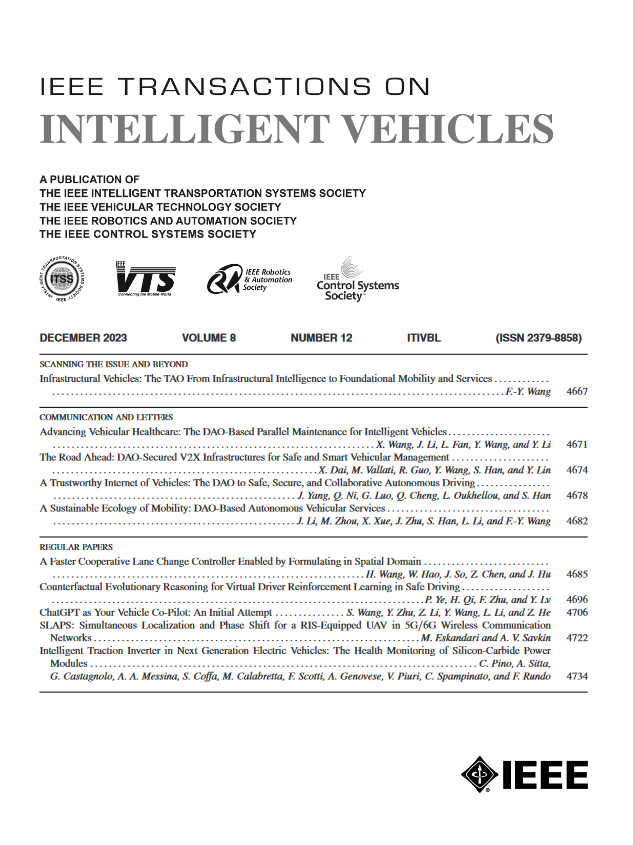Uncertainty-Aware Decision Making and Planning for ICV Based on Asymmetric Driving Aggressiveness
IF 14
1区 工程技术
Q1 COMPUTER SCIENCE, ARTIFICIAL INTELLIGENCE
引用次数: 0
Abstract
Precisely assessing driving threat of road segments could significantly enhance the driving efficiency of intelligent connected vehicles (ICV) within mixed traffic scenarios. Existing methods primarily concentrate on collision probabilities, resulting in an insufficient appraisal of asymmetrical hazard levels attributed to the various interactions. Meanwhile, the uncertainty and communication delay have great influence on ICV, and it is an issue that must be addressed when designing decision-making and planning model. Thus, this study proposes and formulates a new driving aggressiveness model after analyzing asymmetric interactions behaviors among vehicles with different types. Subsequently, aims to verify the capability of generating asymmetric interaction, the driving aggressiveness model is applied on lane-change decision-making and planning. Concretely, the aggressiveness-sensitive lanes-selection model is designed based on game theory, and the uncertainty-aware trajectory planning is developed by utilizing stochastic model predictive control (MPC) and the asymmetric driving aggressiveness. Finally, two naturalistic driving scenarios are utilized to verify the performance of the decision-making and planning model. The outcomes of simulations illustrate that the driving aggressiveness model introduces a novel perspective to assess the asymmetric driving threat. Meanwhile, the uncertainty-aware decision making and planning model can reduce the influence on interactive vehicles, and it has superior adaptability for dynamic and connected traffic environments.基于非对称驾驶攻击性的 ICV 不确定性感知决策与规划
精确评估路段的驾驶威胁可显著提高智能网联汽车(ICV)在混合交通场景中的驾驶效率。现有方法主要集中在碰撞概率上,导致无法充分评估各种相互作用所造成的非对称危险程度。同时,不确定性和通信延迟对 ICV 有很大影响,是设计决策和规划模型时必须解决的问题。因此,本研究在分析了不同类型车辆之间的非对称交互行为后,提出并制定了一个新的驾驶攻击性模型。随后,为了验证非对称交互行为的生成能力,将驾驶攻击性模型应用于变道决策和规划。具体来说,基于博弈论设计了对攻击性敏感的车道选择模型,并利用随机模型预测控制(MPC)和非对称驾驶攻击性开发了不确定性感知轨迹规划。最后,利用两个自然驾驶场景验证了决策和规划模型的性能。模拟结果表明,驾驶攻击性模型为评估非对称驾驶威胁提供了一个新的视角。同时,不确定性感知决策和规划模型可以减少对交互式车辆的影响,并对动态和互联交通环境具有卓越的适应性。
本文章由计算机程序翻译,如有差异,请以英文原文为准。
求助全文
约1分钟内获得全文
求助全文
来源期刊

IEEE Transactions on Intelligent Vehicles
Mathematics-Control and Optimization
CiteScore
12.10
自引率
13.40%
发文量
177
期刊介绍:
The IEEE Transactions on Intelligent Vehicles (T-IV) is a premier platform for publishing peer-reviewed articles that present innovative research concepts, application results, significant theoretical findings, and application case studies in the field of intelligent vehicles. With a particular emphasis on automated vehicles within roadway environments, T-IV aims to raise awareness of pressing research and application challenges.
Our focus is on providing critical information to the intelligent vehicle community, serving as a dissemination vehicle for IEEE ITS Society members and others interested in learning about the state-of-the-art developments and progress in research and applications related to intelligent vehicles. Join us in advancing knowledge and innovation in this dynamic field.
 求助内容:
求助内容: 应助结果提醒方式:
应助结果提醒方式:


